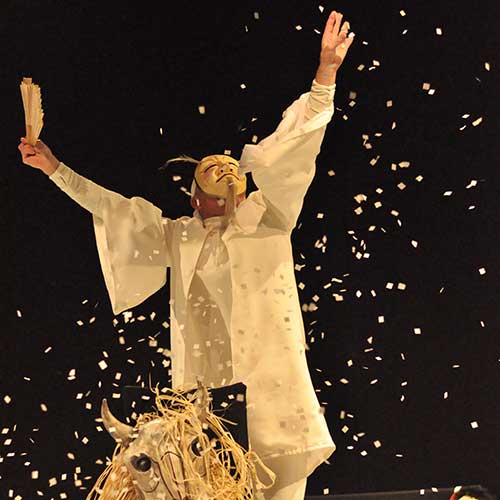
Theatre and dance alumnus built foundation for career in physical performance

In American pop culture today people think of masks as costumes or a disguise to hide behind. They don’t necessarily consider that it’s not about what’s behind the mask—what it’s hiding or concealing—but rather, what the mask is revealing or helping the storyteller behind it to communicate. “The masks that we share in common as a culture are Darth Vader or Freddie from Friday the 13th. This is why we’re often confused by this idea of masked performance,” explains Jonathan Becker ’86. An alumnus of Theatre and Dance at The College of Wooster, Becker specializes in movement in the area of actor training and the use of masks in performance. He founded the North American Laboratory for the Performing Arts, a space dedicated to learning about and the creation of new works. He also owns Theater-Masks.com, a commercial website that has sold over 10,000 masks for professional theatres, individual artists, and educational institutions in 50 countries, including clients like Focus Films, NBC, Juilliard, and Lincoln Center. Though he’s always been interested in theatre, Becker remembers how his first experience seeing a mask performance demonstration at a conference in junior high really hooked him on the idea: “When the actor put the mask on, it was as if the fabric of the air shifted,” said Becker. “Everything in the world changed and became still and quiet. Then he shifted the mask a little bit and everything in the world shifted with it.”
The encounter really inspired him and compelled him to learn and study everything he could about theatre. His parents who both taught at Hiram College valued a liberal arts environment. After looking at a number of colleges in the area, Becker found the best fit at Wooster, where “the students were excited about the school they were going to, excited about the faculty, the opportunities they had, and excited to meet me,” he said. He found himself focusing deeply on dance training as well as theatre and acting while at Wooster, exploring the physical aspects of performance. He remembers the passion, drive, and “frank feedback” he received from professors like the late Annetta Jefferson, who served as chair of the theatre department at the time, and Kim Tritt, professor of theatre and dance. “Jonathan was one of my first senior Independent Study advisees when I began teaching at Wooster,” said Tritt. “He was curious about exploring an expressive form moving in mask; a true relationship of movement and theatre.”
Leading up to I.S., Becker spent his junior year in College interning in New York, exploring different opportunities in theatre and ultimately settling into an internship with the organization then charged with producing the New York Festival of Clown Theatre. “I took the experience from the workshops I attended in physical comedy, mime, masked theatre—all the ideas I was introduced to—back to Wooster and set out to create a performance.” This performance that Becker wrote, directed, produced, performed, and toured with throughout his senior year became his I.S. As he works with fellow actors and artists today, he relies on the fundamental skills he started to build when he developed his first major production. “The experience of sitting in small groups, discussing, teaching each other, immersing oneself into an enormous creative project and being expected to implement was a graduate experience in an undergraduate environment,” he said. “I have always been interested in the poetry of physical performance. I.S. gave me the opportunity to put together everything I had learned up to that point. The further away that I get from Wooster, the more that I realize it was the foundation of everything. It’s there that I learned how to learn, to problem solve, where I developed this idea that nothing is impossible, and that all problems have a solution.”
Many of the actors that performed for Becker’s I.S. wore masks that he made for the project, and as he continued in the field, he made more masks to use for performance while studying at the Jacques Lecoq International School of Theatre in Paris, France, and later while touring internationally as a teaching artist. He earned his master’s at the University of Akron and an MFA in Theatre Pedagogy from Virginia Commonwealth University, taught at the National High School Institute at Northwestern University, and later helped develop the acting program at Ball State University in Muncie, Indiana. Creating masks began as a side project and led to a commercial website and Becker’s reputation as a teaching artist, performer, and master mask maker.
 “Masks are part of a pedagogical approach used to teach the principles of performance and creation,” said Becker. “Each mask that leaves the studio is a new challenge. There’s no system, no formula. I’m teaching myself to start again with each new project.” Becker’s experience with mask making draws hundreds of orders annually from clients around the world including leading universities and training programs in the U.S., Canada, and Europe. He fills all the orders from his studio in Muncie, Indiana, often working with students to meet demand. Becker explains that theatre masks are not costumes but the “driving force of the theatrical event.” While actors work to provoke empathy from an audience, the mask heightens that ability in a way that provokes greater empathy and tells them more about the character and the story. The mask “creates a rhythmic or expressive form that appears to change expression as it moves through space or as the body moves underneath it. That’s achieved by paying attention to how the rhythmic lines and planes of the mask itself are interacting with the negative space around the mask. That’s how one creates the illusion of change in the rigid form for the viewer from the outside,” Becker said. By creating masks that “play,” that reveal and create new layers of understanding for the audience, Becker sees his work “changing perspectives and opening new worlds and meanings to people.”
“Masks are part of a pedagogical approach used to teach the principles of performance and creation,” said Becker. “Each mask that leaves the studio is a new challenge. There’s no system, no formula. I’m teaching myself to start again with each new project.” Becker’s experience with mask making draws hundreds of orders annually from clients around the world including leading universities and training programs in the U.S., Canada, and Europe. He fills all the orders from his studio in Muncie, Indiana, often working with students to meet demand. Becker explains that theatre masks are not costumes but the “driving force of the theatrical event.” While actors work to provoke empathy from an audience, the mask heightens that ability in a way that provokes greater empathy and tells them more about the character and the story. The mask “creates a rhythmic or expressive form that appears to change expression as it moves through space or as the body moves underneath it. That’s achieved by paying attention to how the rhythmic lines and planes of the mask itself are interacting with the negative space around the mask. That’s how one creates the illusion of change in the rigid form for the viewer from the outside,” Becker said. By creating masks that “play,” that reveal and create new layers of understanding for the audience, Becker sees his work “changing perspectives and opening new worlds and meanings to people.”
As he thinks about the impact he hopes his work as an artist will have, Becker said, “My hope is that in the act of creating and sharing that creation with others establishes an uplifting and furthering environment that helps to bring people together with a sense of community,” and added that, “The greatest problem we have in our world today is that we are afraid of what we don’t understand and what we don’t know. We put that fear on the other, but if we knew their story, we would see that it was our story as well, and we would no longer see them as the other but as a member of our community. I would say that’s probably my greatest hope for the work.”
Image 1: Becker performs a demo, “Facing Humanity, a celebration of
world culture,” in Nanjing, China. Photo provided by Becker
Image 2: Becker teaches in an NALPA Teacher Training Workshop.
Originally published in the winter 2020 issue of Wooster magazine.
Posted in Alumni on February 28, 2020.
Related Posts
Related Areas of Study
Theatre & Dance
Scholarship and artistry in theatre and dance for those who are passionate about performance in all its forms.
Major Minor

